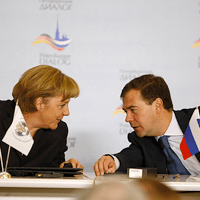Germany’s handling of the sovereign debt crisis gripping the eurozone has led some to wonder whether Germany has lost interest in Europe, or in the role it has historically played in the European Union. But does Germany really believe it has other, global options for a more unilateral foreign policy? Is Berlin falling prey to an Eastern temptation, whether from Moscow or Beijing? The answer is clearly “no,” but it is a no that has shades of gray. And those shades of gray are now combining to cast a shadow over the skies of Berlin; German foreign policy is no longer unambiguous, to say the least.
The problem can be traced to the fact that Germany, as Henry Kissinger once noted, might be too big for Europe, but too small for the world. The post-World War II accommodation left Germany embedded in a dense network of institutionalized Western relations, from NATO to the EU. The new “German question” seems to be whether Germany at the beginning of the 21st century is still able and willing to engage thoroughly in European integration, or whether it is winding its way out of the EU to go global alone. For its part, the German government has put an increasing emphasis on its European commitment in recent months. At the beginning of this year, German Foreign Minister Guido Westerwelle not only underscored the importance and value of Europe for Germany, but also defended Germany’s euro-crisis management, which for months has been under fierce attack for being “too little, too late.”
Nonetheless, it is fair to argue that the new German question has not yet been definitively answered, with three simultaneous developments contributing to the uncertainty. First, Germany is renegotiating its hegemonic role in the EU and Europe, as well as the price it is willing to pay for it. Second, it is also renegotiating its relations between East and West, and between Europe and the world. Third, Germany is increasingly substituting trade policy for foreign policy, instead of developing a coherent concept for how to combine economic and political power and embed trade policies in a strategic concept of foreign policy. In other words, foreign policy and trade policy are out of sync, leaving Germany an economic power but a political dwarf, the equivalent of a supersized Switzerland.

